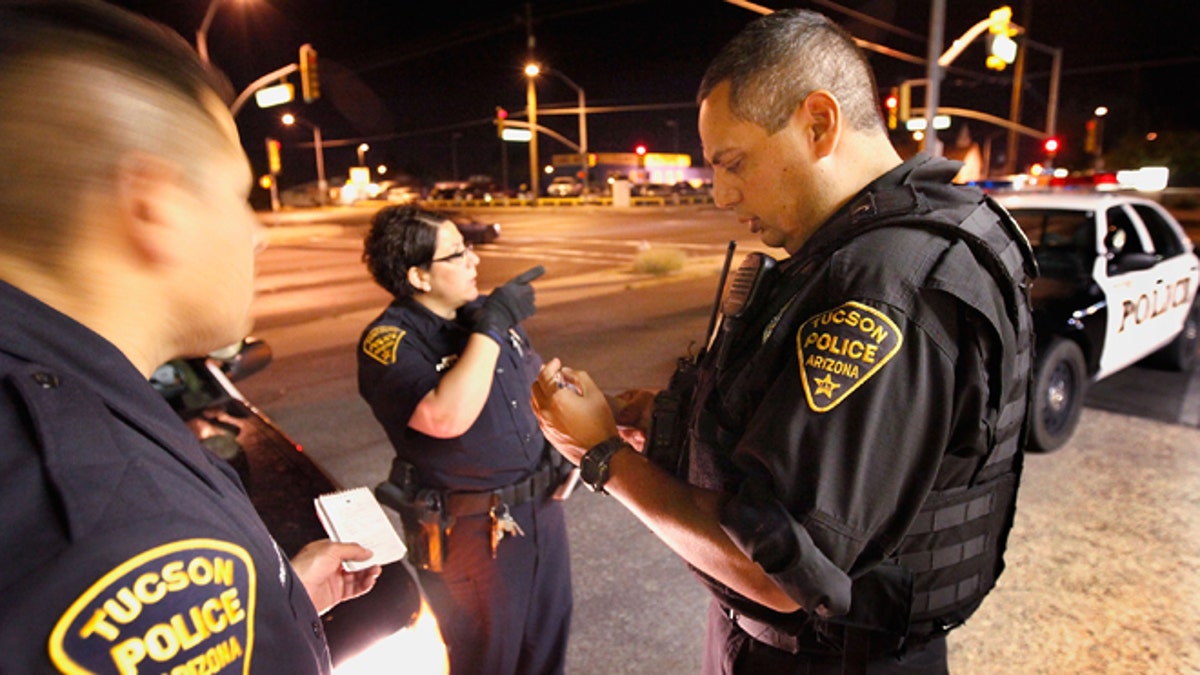
TUCSON, AZ - JUNE 03: Leon Gutierrez (R), of the Tucson Police Department's Gang Tactical Unit, assists patrol officers Luis Hernandez (L) and Jessica Stoneham who were responding to a fight June 3, 2010 in Tucson, Arizona. The Tucson Police Department is currently gearing up to begin training its officers on the implementation of the states controversial new immigration law SB 1070. Among other things the new law makes it a state crime to be an "unauthorized alien" or to knowingly harbor, hire or transport an unauthorized alien. A Tucson police officer was one of the first to file suit in federal court challenging the new law. (Photo by Scott Olson/Getty Images) (2010 Getty Images)
TUCSON, Ariz. (AP) – Tucson police said Wednesday they will no longer fully enforce the state's landmark immigration law that requires local police to check the immigration status of people they encounter while enforcing other laws.
Chief Roberto Villaseñor said his officers will now only check immigration status and call the U.S. Border Patrol when a person has prior serious felony convictions, poses a threat to national security or has gang affiliations.
The criteria was set out for federal immigration authorities in an executive order issued last month by President Barack Obama intended to prioritize offenders for deportation.
The Arizona law, SB 1070, requires police, while enforcing other laws, to question the status of people suspected of being in the country illegally.
The Tucson Police Department appears to be the first major law enforcement agency to announce scaled-back enforcement of the law.
Phoenix police spokesman Sgt. Jonathan Howard said he did not believe his department was changing its policy regarding SB 1070 enforcement.
Villaseñor cited a provision in the law that says police should only enforce it when it is practical. He contends it is no longer practical because immigration authorities do not respond to calls by police in the vast majority of cases.
Tucson officers have placed about 11,000 calls to the Border Patrol since July on such matters and only received 94 replies, the chief said.
"So it's really a futile effort," he said.
Villaseñor has been a vocal opponent of the law but has said he is obligated to enforce it.
When the Tucson City Council raised concerns about school resource officers asking about the immigration status of students in high schools in September, Villaseñor said police would be breaking the law if they didn't abide by SB 1070.
However, at a meeting Tuesday, the City Council approved an amended contract that bars police from asking students about their immigration status.
Obama's sweeping directive allows some immigrant parents of U.S. citizens to remain in the country through a program similar to one known as Deferred Action for Childhood Arrivals, which prevents the deportation of youth who were brought to the country illegally as children.
"The vast majority of people that we do charge and arrest on a daily basis are not gonna fit the criteria that would require a Border Patrol check," Villaseñor said. "It's a change, but I think that every agency across the state is approaching 1070 differently."
Former state Sen. Russell Pearce, the architect of the law, said he found the new policy in Tucson to be an insulting violation of SB 1070.
"It's nothing less than malfeasance," he said.
Pearce said the part of the law spelling out practical enforcement applied to police officers who were in the middle of an investigation into someone's immigration status and had to respond to a more urgent call.
"That's not a policy to sit on your butt to do nothing," he said.
Villaseñor said officers will stop checking the immigration status of some people by the end of the week. Police will still conduct criminal background checks and call immigration authorities if a person falls under the priorities used by federal officials.
James Lyall, an attorney for the ACLU of Arizona, said he was skeptical about the changes.
"The fundamental concern remains: Are local law enforcement stopping people for the wrong reasons, and are they holding them solely to conduct an investigation of their status?" Lyall said. "If either of those things are happening, that violates the law."








































